Warwick resident launches grassroots campaign to save pollinators
Warwick. The force behind Warwick’s “Pollinators Welcome” signs.
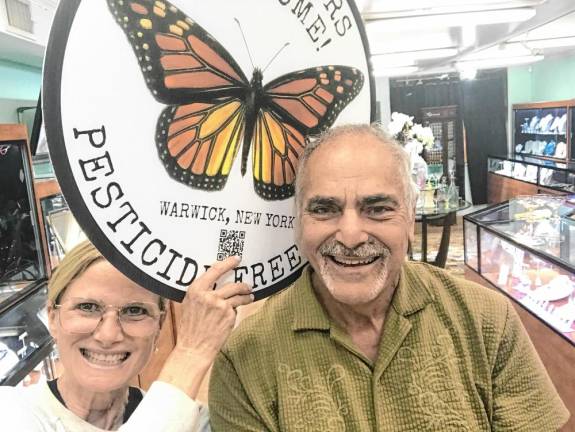

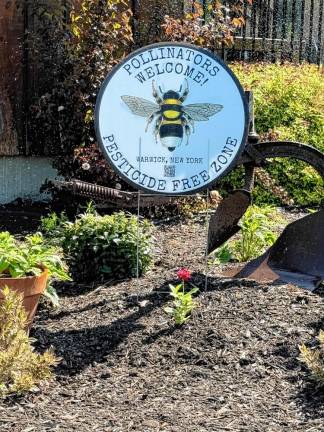
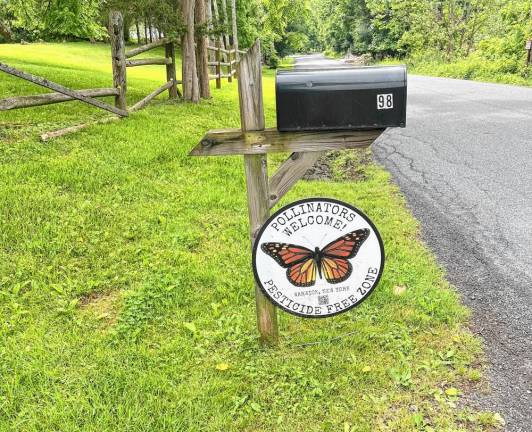
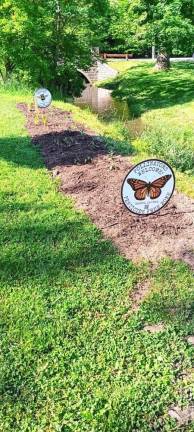
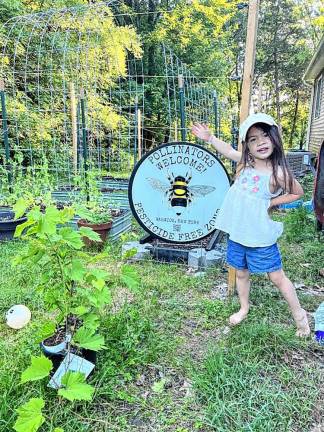
A bee’s life isn’t easy. Day in day out, you’re visiting flowers and gathering pollen to take back to your hive, not knowing whether your daily crop will be your undoing. Bees, like butterflies, wasps, moths, and essentially any creature that routinely helps carry pollen from plant to plant, are considered pollinators. They are a key component in our food chain. However, due in part to the overuse of pesticides, many pollinators species, including bees and butterflies, are dwindling at an alarming rate.
While the plight of the pollinator is not new, the threat persists, and populations of certain species continue to decline. That’s one reason why Warwick resident Sally Greco decided to get the word out about this key issue.
If you’ve been around town lately, you may have seen some of her work, signs denoting “pesticide free zones” saying “Pollinators Welcome!” with a QR code providing more information.
“I had the sign idea for a long time, but the concept didn’t come to life until I partnered with my good friend Suzanne O’Brien from Moonshine Salvage, which is her ‘slow fashion and home goods’ company. Sue took my ideas and created the design. There were several versions created before arriving at this final decision,” Greco explained.
Greco moved to Warwick about 15 years ago with her husband to start a family. In a previous life, she was in the banking industry, but said a “quantum shift” inspired her to study health and nutrition. “As part of this journey, I learned about the harmful effects of pesticides on human health.”
Greco also has deep regard for the animal kingdom, and when not rooting for the pollinator she takes care of two Brussels griffons named Harley and Bennie. “It is painful to see what is happening to pollinators, bugs, the soil, and human health as a result of Monsanto/Bayer’s Roundup and the multitude of other chemicals being used not only by professionals, but by the general population. I wanted to start a movement, or at minimum a conversation, about this passion.”
Greco said she realized the value of just having a conversation after speaking with Albert Wisner Library Director Lisa Laico. “She was open to eliminating pesticide use on the property and took matters into her own hands.” After getting advice from Cornell Cooperative Extension on best practices for a pesticide-free lawn, the library stopped using pesticides this year.
That single conversation sparked several others within the Warwick community. Greco has since spoken with housing developments, local politicians, and many residents, and has eyes on a few of the bigger pesticide users, such as golf courses.
The next step in her campaign was to create something people could see on a regular basis, to spur those conversations on a broader scale. “Creating these signs is a way for me to make a difference by giving people a voice. It’s a way for people who are proud of their yards, despite not having used harmful neotoxins, neonicotinoids, pesticides, herbicides and fungicides, to shout out to the world that we need to give this earth a break.”
Along the way, Greco has been aided in her mission by people like Michael Helme of Sustainable Warwick, who helped provide a platform to disseminate information, and Abbey Ashley and Warwick Mayor Michael Newhard, who helped establish Warwick as a “monarch village,” on behalf of the monarch butterfly. “As a result of this effort, our children and the schools are making strides to help the pollinators. Grassroots education like this will have a lifelong effect on our planet’s future,” she added.
Now Greco has about 50 signs up at various locations throughout Warwick, including in Stanley Deming Park, in Homestead Village, on Sleepy Valley Road, the Warwick Community Gardens, and many more. Residents can also buy them for their own yards to declare their pesticide-free status through Corwin Florist (12-16 Galloway Road, Warwick) for $15, which includes the 22” sign and a sign stand.
Looking ahead, she hopes to convince more elected officials to take notice of this issue, and maybe even extend her campaign across the country and beyond.
“We all know that the bee population has been decimated. It’s not okay, and it feels hopeless. Population destruction of these pollinators, and all bugs and insects, is a direct result of pesticide use and habitat loss. It is controllable, and we can do our part here in Warwick.”